‘Worse than toxic’: Employees allege culture of retaliation at Boise public health district
Gina Pannell was on the front lines of the COVID-19 pandemic.
As a Central District Health leader, she attended school board meetings at a time when trustees were grappling with public health measures. She advised the public on COVID-19 testing. She appeared in local news stories providing updates on the community spread. By December 2020, thousands of Idaho residents had been hospitalized. More than 1,500 had died.
Former employees at Central District Health, the Boise-based public health district that serves four counties, said that despite the challenges, they loved the work, they loved the mission. Some of them planned to retire there and had long-term goals to move into leadership roles. But over the next few years, something changed.
“The trust that was given to me to be a face of a health department was almost eliminated in such a short period of time,” Pannell told the Idaho Statesman.
She was promoted to be a division administrator in 2021.
By June 2022, Pannell had left the district. Others followed.
The Statesman spoke with 17 former and current employees who described a pattern of retaliation that they said jeopardized public health services. Most spoke on the condition of anonymity, fearing retribution.
Some said they had come forward with concerns about discrimination against Hispanic employees, only to receive backlash. Others said they faced repercussions when they pushed back on Central District Health actions that ignored best practices for public health.
Employees said health programs hung on by a thread as essential employees who worked on the programs left in droves. Some resigned, some were fired and others said they were forced out. At least three employees went on family medical leave, returned to work to get fired and were barred from receiving unemployment benefits, records obtained by the Statesman showed. When those three employees appealed the unemployment decisions, refuting CDH’s narratives, the state ruled in the employees’ favor.
In emailed responses to allegations outlined by the Statesman, CDH Director Russ Duke, who has worked at the agency for 18 years, said he believed the problems were “limited to a relatively small group of people who worked together.” He attributed the high turnover, which he said doubled in 2022 compared with the agency’s typical average, to the immense pressure and stress staffers faced during the pandemic. About 190 employees had left the agency since January 2021 as of September, according to documentation obtained by the Statesman through a records request.
But employees told a different story. CDH leaders pushed out workers “with experience, who wanted to be there, but didn’t feel like they were cared for, they didn’t feel respected,” Pannell told the Statesman. Employees, including Pannell, filed complaints with the Idaho Human Rights Commission, provided emails sent to CDH leaders and the attorney general’s office, and showed copies of their appeals over unemployment benefits.
Several longtime employees said they felt distrusted and micromanaged — a sudden, “palpable” shift, Pannell said, from when she was trusted to provide critical input on the district’s response to COVID-19.
“It was so hard to reconcile” how employees were treated, Pannell said, “because so many of the people who have left were the people who got that health district through COVID.”
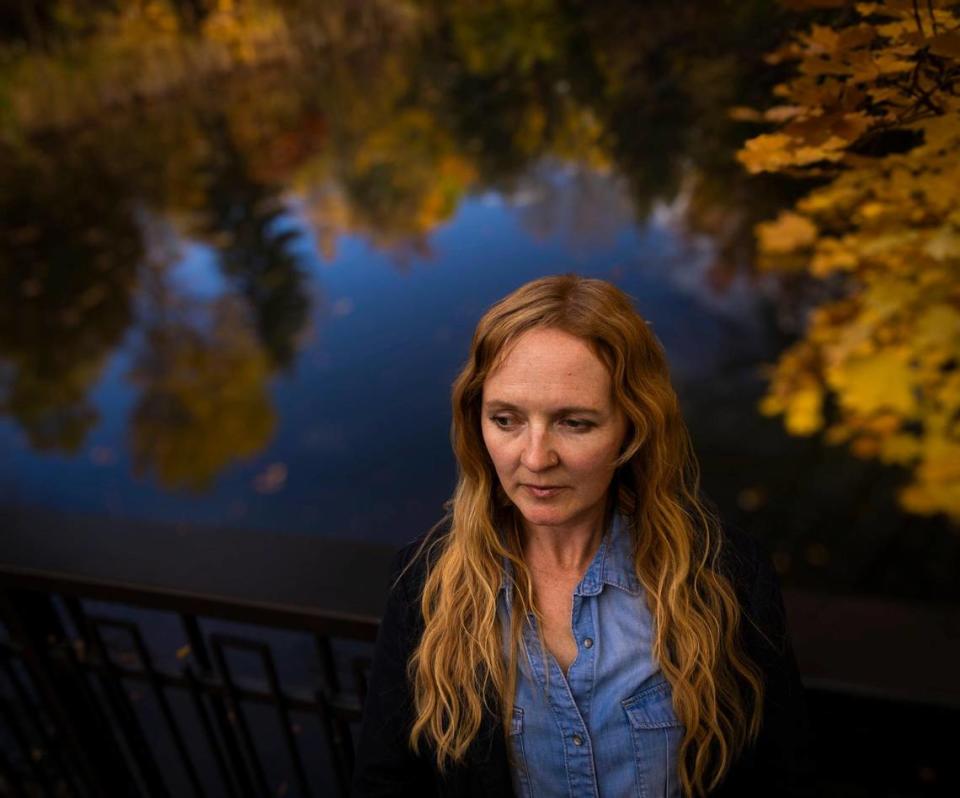
‘Illness is not misconduct’
Employees who worked with Pannell told the Statesman they struggled with her sudden departure and found it alarming. One employee who co-chaired the diversity, equity and inclusion committee said the work culture grew worse — “it was immediately terrible,” she said.
Pannell, who won the CDH director’s award for distinguished service in 2021, said she left Central District Health after more than six cumulative years working there because she felt intimidated, disrespected and demeaned by Gary Foote, the district’s human resources officer. In April, she filed a Human Rights Commission complaint, records of which she provided to the Statesman, alleging she was discriminated against as a woman and berated in front of her colleagues for asking about salary adjustments for one registered nurse.
A private attorney representing the health district denied Pannell’s account, in response to Pannell’s Human Rights Commission complaint. Duke said in an affidavit that in interactions he observed, Foote “always” conducted himself professionally, including in his conversations with Pannell. Foote, in his affidavit to the commission, acknowledged that he spoke with Pannell, but he had a different account of what was discussed on salaries and denied Pannell’s characterization of his reaction.
Nearly all allegations described from the 17 employees the Statesman spoke with traced back to two members of leadership: Foote, who was hired in July 2020, and Stephanie Myers, a division administrator who was hired in August 2022 to replace Pannell. Former employees said that when they had complaints about Foote himself, they had no one else to approach.
Foote declined to comment, and Myers directed the Statesman’s questions to Duke.
Zack Ward, a program manager who worked under Pannell, said he discussed his concerns with Duke in losing Pannell — that the district “just lost a really important person” and that something at the agency was wrong. He said he thought his close alliance with Pannell put a target on his back.
“I don’t know what could be worse than toxic, but it was worse than toxic,” Ward told the Statesman. “It was just an awful place to be in.”
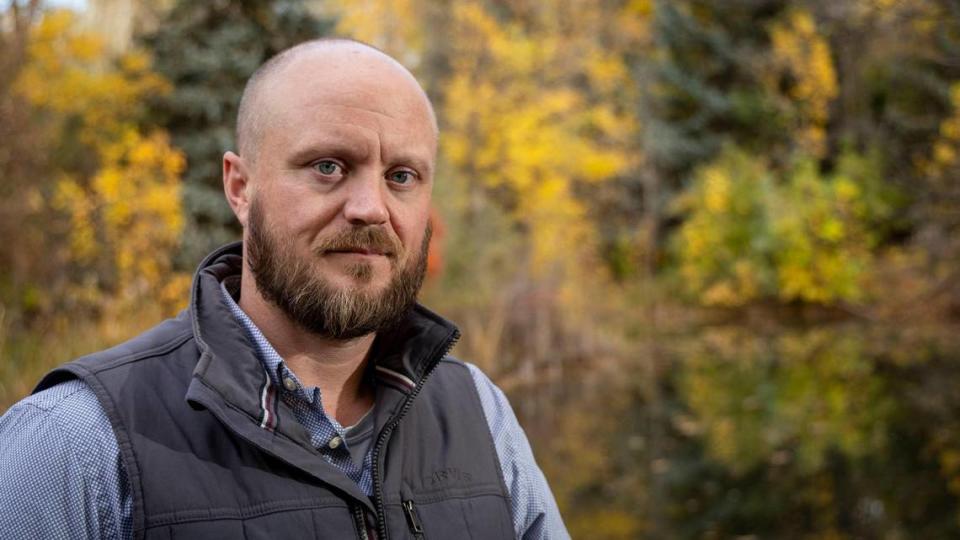
Ward had worked at the district for six years total and was promoted to be a program manager in September 2021. In December 2022, he returned from one week of medical leave and was fired, records showed.
Though he said he didn’t know the reason at the time, he learned after he filed an appeal for unemployment benefits that Central District Health told the state he was fired for “insubordination” and misconduct. In Ward’s letter of termination, CDH said he was fired for working while he was on medical leave, by sending emails to staffers, despite instructions not to do so. Ward doesn’t dispute that he sent some work emails to tie up loose ends while he was gone.
CDH spokesperson Maria Ortega, in an emailed response to the Statesman, said Central District Health “has nothing to do with the Department of Labor’s decisions regarding unemployment benefits.” But state law outlines that when a former employee files a claim for unemployment benefits, the employer is informed and can submit additional information “to support their side of the story,” Idaho Department of Labor spokesperson Georgia Smith told the Statesman by email. Based on information the Department of Labor receives, the state agency then determines whether the employee was discharged for misconduct.
Idaho Department of Labor’s Appeals Examiner Paul Kime granted Ward the benefits. He wrote in his decision that although Ward was placed on a performance improvement plan in November 2022, he would not have been fired under that plan and received no warning. In Kime’s decision, which the Statesman obtained, he said an “isolated act or good faith error in judgment” is not considered misconduct. Ward was also prompted to respond to Central District Health’s email instructing him not to work, Kime concluded.
“Employer can’t have it both ways: requiring claimant to perform work-related activities (the email reply to the employer), and then discharging claimant for performing work-related activities,” Kime wrote.
Two other former employees at Central District Health provided to the Statesman records of their successful appeals for unemployment benefits with the state. Both were fired shortly after they used the Family Medical Leave Act to take time off.
One employee told the Statesman she had been raising safety concerns and “making waves” since she reported a death threat the public health district received in October 2021. The husband of a patient was upset about his wife’s care and threatened to kill another district employee, who was the wife’s health care provider, according to an incident report and Boise police report obtained by the Statesman.
The employee told the Statesman that she had experienced anxiety, which “was not because of the death threat. It was how I was treated by management afterwards.”
“I still have no closure,” she told the Statesman. “Normally the risk management team, they meet and they go over the incident report and they try to assess like: ‘What did we do right? What could we improve upon to make things safer for whoever’s involved if this were to happen again,’ you know? And none of that happened.”
That employee said she felt she was ultimately retaliated against for pushing back when Myers told her and a co-worker in a February meeting that staffers shouldn’t speak Spanish at work. She eventually filed a complaint of discrimination against Hispanic employees with the Idaho Human Rights Commission, records obtained by the Statesman showed.
“I advocated for my direct reports to continue speaking their first language with each other, and I was written up for insubordination and discharged, as were my co-workers who similarly championed our Spanish-speaking co-workers,” she wrote in her complaint filed in July.
Months earlier, in March, she sent an email to the CDH board and the attorney general’s office while on medical leave for “work-related post-traumatic stress disorder,” according to records. In that email, she said she continued to experience harassment and retaliation, and was afraid to return to work. Duke as the board secretary replied and sent her complaint to Foote.
Central District Health referred to having “medically laid off” the employee after she asked to extend her medical leave in May, according to the termination letter she received from Duke. Ortega by email told the Statesman a medical layoff can occur once an employee exhausts all FMLA leave “and cannot perform the essential functions of their job.”
The Idaho Department of Labor ruled that the employee quit “for reasons other than good cause,” according to her appeal. But the Idaho Industrial Commission, which decides on elevated appeals after a Department of Labor appeal is unsuccessful, ruled in the employee’s favor and granted her the unemployment benefits.
“Employer separated claimant because she was ill,” the Industrial Commission concluded in her case. “Illness is not misconduct.”
Another employee, Liz Cosio, said Foote told her she didn’t qualify for FMLA for a surgery. Though her laparoscopy should have been a quick procedure, Cosio said that because doctors diagnosed endometriosis, the surgery was more complicated than expected, leaving her with a much longer recovery time. She said she was told to come into work for one day during that period to train a co-worker, despite a doctor’s note that was sent to human resources stating she should work from home.
“We interact with the community on a daily basis, and when you have staff showing up who need to be on FMLA, but can’t be on FMLA, like what kind of customer service are they delivering?” Pannell said. “It’s not going to be great.”
Ortega in an emailed response said the FMLA “is a federal law that prevents retaliation for its use. It is taken very seriously at CDH.”
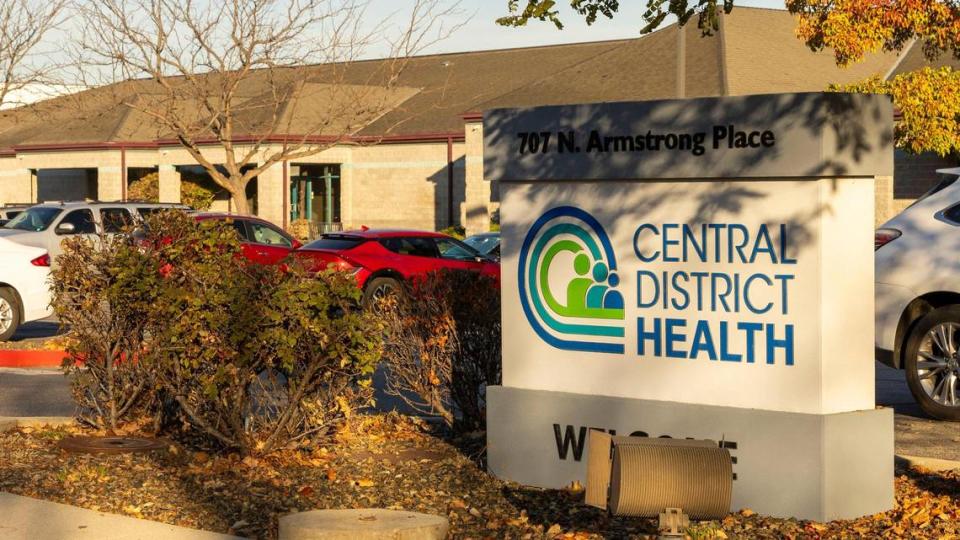
Boise at-risk mothers disenrolled from program
On May 5, 2021, Idaho Gov. Brad Little signed into law a bill that changed some ways public health districts were governed. House Bill 316 transferred responsibility from the state onto the counties to cover uninsured patients who couldn’t pay for medical services and qualified for aid. Lawmakers and supporters at the time said it saved the state money and acted as a compromise for counties that didn’t want to contribute to the state’s Medicaid expansion.
The new law also made all personnel decisions, including salaries, hiring and firing of employees, the “exclusive responsibility” of the public health director, with the approval of the public health board. Central District Health employees were no longer able to escalate a discrimination complaint to the Idaho Personnel Commission, which provides oversight of the state’s HR departments. The law went into effect in March 2022.
Duke told the Statesman that House Bill 316 meant the laws applying to state agencies no longer applied to Central District Health, and that included rules from the Personnel Commission. CDH “adopted a personnel policy that is almost identical to those of most of the cities, counties and highway districts in Idaho,” Duke wrote to the Statesman.
The change through House Bill 316 “does not mean that there is no oversight or there is an inability for an employee to seek help,” Duke told the Statesman by email. “All local government employees have rights, and those are enforced in numerous ways, including by the Human Rights Commission.”
Duke also pointed to a September 2023 study that stated some public health experts said the years post-pandemic had “the greatest exodus of public health workers throughout American history.”

Among those who left CDH was Leanna Davis, a technical records specialist who worked there for more than 20 years. She resigned in February, less than six years away from collecting her pension, she told the Statesman.
Davis told Duke in an email, forwarded to the Statesman, that she felt retaliated against after putting in her resignation. Her January resignation letter cited a “toxic work environment” that prompted stress and physical ailments, and a feeling of disrespect after the years she dedicated to the agency.
“I’ve experienced discrimination, (I’ve) been treated unethically and I’ve worked in toxic unhealthy environments,” Davis wrote to her supervisor in an email, which copied Duke and Foote. “The environment has been changing again and I’m just not willing to put my ethical standards or my physical and mental health at risk again, which is why I decided to pursue another job.”
The “final straw” for her was having been ignored when she brought a serious problem to light. Last year, emails she provided to the Statesman showed she reported that the district erroneously billed an insurance company for Medicare, and continued to follow up with the district after she said nobody had corrected the errors. In his response to the Statesman, Duke blamed the issue partly on Davis and said the matter was resolved.
In February, Duke responded to her in an email, which Davis shared with the Statesman, saying that her claim would be discussed in executive session at the Feb. 17 board meeting. Valley County Commissioner Elt Hasbrouck, who chairs the Central District Health board, denied knowledge of any of the allegations, of both the improper billing and retaliation. He did not respond to specific questions about whether the board would investigate the allegations.
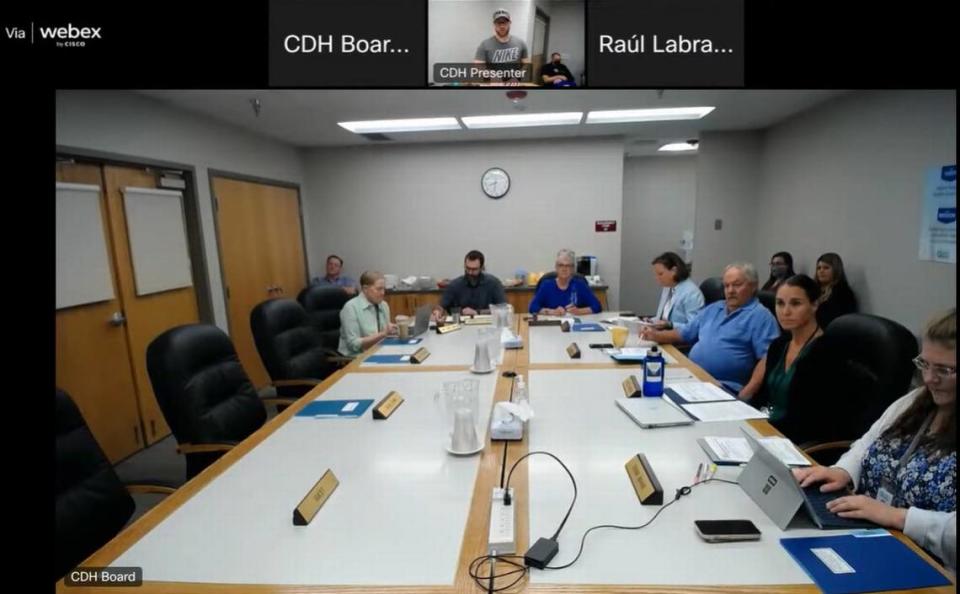
Those who left also included all the nurses involved in the Nurse Family Partnership program, a popular initiative that Central District Health began offering in December 2022 and helped health outcomes for newborns and low-income mothers. The program is no longer running at Central District Health after “untimely departures” of two nurse home visitors and a nurse supervisor, Olivia Biggs, spokesperson for the nonprofit National Service Office, told the Statesman by email. She said all 20 families were disenrolled in September, when CDH hadn’t hit capacity for the program and was still receiving referrals.
Eliza Shabire, a mother in Boise who was enrolled in the program, told the Statesman she received a call in September from a nurse who told her she’d be disenrolled from the Nurse Family Partnership. Shabire, who was visiting her husband in Rwanda at the time, told the Statesman she believed it was an important program to continue.
“It was a good program,” Shabire said by phone. “When I started, I didn’t know anything about being a parent, and they just showed me everything.”
Josie Graham, a former program manager, said employees she stayed in touch with indicated they resigned because of the lack of support they felt from CDH leaders. Though the Nurse Family Partnership program started after Graham left the district, she said she had helped the district build structures in place to begin the services — and that programs suffered whenever workers with specialized licenses, who were difficult to hire, left.
Graham also oversaw the infant and early childhood mental health program, which provided in-home visits to children with a mental health diagnosis between ages 0 and 5. That program also ceased, she said.
Programs Graham once managed “just don’t even exist anymore,” Graham told the Statesman. “I’ve seen programs that we were trying to build, that we were hiring credentialed folks to run, just completely disappear.”
Duke told the Statesman that Central District Health has hired a nurse manager and nurse home visitor for the Nurse Family Partnership, and that the district will begin enrolling families again once they complete their training in December. He said that all of the disenrolled mothers have been referred to other programs they qualify for, and that they still have an obstetrician as a primary contact.
The Statesman asked what Central District Health’s plan was to retain newly hired nurses.
“We plan to use the same retainment plan for our newly hired staff that we use for all CDH staff by offering competitive wages, excellent benefits and a great workplace culture,” Duke responded.
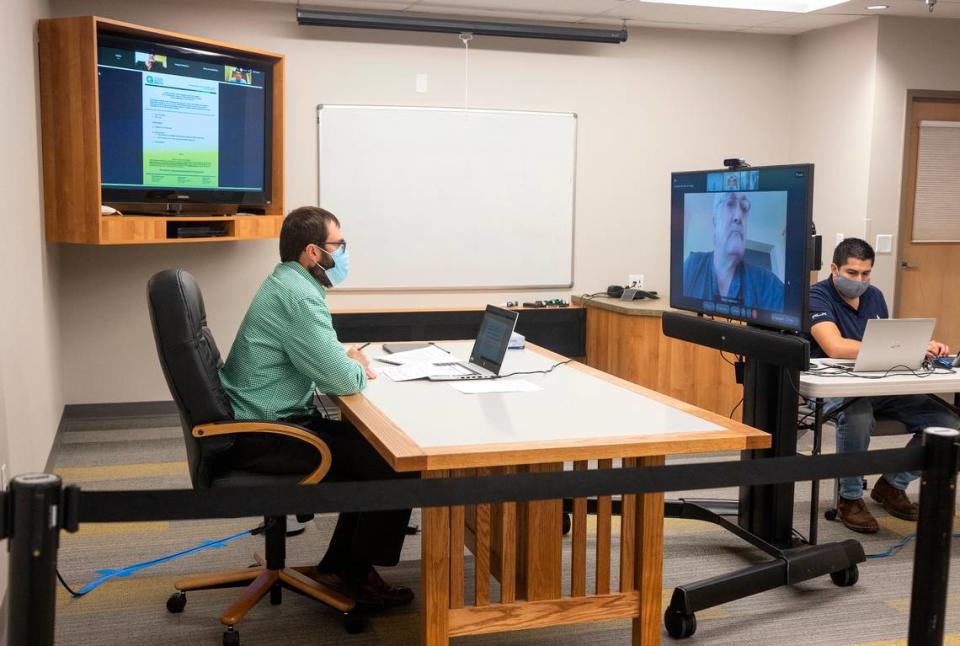
Speaking Spanish ‘is not prohibited’
In February 2020, Cosio was tasked with informing Spanish speakers who visited the public health district’s testing locations that they had tested positive for COVID-19. She also conducted public health investigations, known as contact tracing, to track community spread of the virus.
“I loved my job. I loved what I did, what my role entailed more than ever,” said Cosio, now 25. “I thought maybe I had finally found what I was looking for.”
Two employees said Myers told them in a February 2023 meeting that staffers should not be speaking Spanish at work. The alleged discrimination prompted at least one complaint filed with the Idaho Human Rights Commission and at least one complaint sent to the attorney general’s office, from different employees, records obtained by the Statesman showed.
The manager who co-chaired the district’s DEI committee told the Statesman she fielded four complaints from employees who were told staffers shouldn’t speak Spanish at work. She reported it to Duke, she said, and within 24 hours, she was being investigated. She told the Statesman that after she received a letter of reprimand, which she refused to sign because she said it was inaccurate, she had a panic attack and took the following day off of work.
When she returned, she said Foote, the HR officer, gave her a choice — either resign or get fired. She resigned.
In a March 2023 email sent to Attorney General Raúl Labrador, a Central District Health board member at the time, she reported a “discriminatory and hostile work environment perpetuated at the agency” and asked him to conduct an investigation. She said two administrative assistants, one of whom is Mexican American, and two fellow managers informed her Foote and Myers told Spanish-speaking staffers not to speak Spanish, and that “speaking Spanish could be used to spread gossip at work.”
“As you may be aware, Central District Health has experienced massive turnover, including two division administrators quitting, within the last year,” she wrote to Labrador a week after she left. “This turnover is not coincidental. It is in direct response to the inhospitable environment supported by upper leadership and HR.”
In an email to the Statesman, Labrador spokesperson Phil Skinner said the attorney general’s office doesn’t have the authority to investigate discrimination or retaliation complaints of public employees.
“At the time of the initial communication with our office in March, the matter was being handled by CDH according to their internal policies,” Skinner said. “We received no additional inquiries about the personnel matter after the initial communication.”
In an email sent Feb. 28, and obtained by the Statesman, Myers told staffers that “this information is not accurate; the use of Spanish, or any other language, is not prohibited in practice or policy at CDH.” Myers went on to say that staffers should be “inclusive in conversations in business areas within CDH,” and to be aware of “the perception that may occur” when speaking a language in the presence of those who don’t understand it.
“It can make others feel left out of the conversation or bring up other negative feelings,” Myers wrote. “In the spirit of having a respectful workplace, I expect all staff to be inclusive in our conversations in the business setting while honoring our unique backgrounds and contributions.”
Duke told the Statesman the “rumor” began when a bilingual employee noticed another bilingual employee was providing instructions in a language not all employees understood. Staff members misunderstood the conversations as guidance not to speak Spanish, Duke said, prompting the email sent out by Myers.
“There has never been an English-only policy at CDH,” Duke wrote. About 30% of CDH employees are bilingual, he said. “It is common now and has always been common to overhear multiple languages other than English being spoken in work areas, hallways and break rooms at CDH. Nevertheless, it is appropriate to remind staff to be inclusive when questions arise, and that is what we did.”
Duke had assured Cosio that she was allowed to speak Spanish, she told the Statesman. Records showed she was getting trained as a medical interpreter at the time. But even after Duke’s assurance, Cosio said that whenever she spoke the language to other Spanish speakers, they told her they weren’t allowed to speak Spanish and that she needed to speak to them in English.
“To me it kind of left me guessing like, so then why did you hire me, you know, if you don’t want me to speak Spanish?” Cosio told the Statesman.

Cosio said “everything started to crumble” for her at the beginning of this year, after she inquired about the Spanish language instructions. She felt disrespected and bullied by co-workers. She reported an incident when one co-worker sketched a drawing of her on a whiteboard during a meeting and sent a photo of it in messages to others, she said, and nothing had been done. Cosio said that her supervisor didn’t act on any of the incidents she’d report involving co-workers, and that leaders never listened to her concerns.
In a letter of reprimand Cosio received in March, Myers said she had broken a code of conduct by sharing “inaccurate and confidential personnel information” by speaking about a former employee. Cosio refused to sign the letter because she said the information in it was false. Cosio said she believed leaders assumed she had been gossiping in Spanish and marked her down for advising a co-worker.
Cosio was reevaluated in late April, despite having received a performance evaluation in November 2022. Within six months, her evaluation shifted from a “high performer” rating to “does not achieve,” the evaluations showed. She shared them with the Statesman.
Duke had sent an email to staffers in May that said salary raises hinged on performance evaluation ratings. In the email, which the Statesman obtained, Duke said the district would continue to use the state’s classification system for salaries and employees must receive an “achieves” rating or higher for wage adjustments.
Cosio told the Statesman that for months, she’d come home, and her husband would comfort her, hear her complaints and see her cry. After he witnessed how stressed and upset she had been, he insisted that she resign, she said.
“Finally it was just like, ‘No — you need to be done,’ ” Cosio said. “ ‘You need to move on.’ ” She resigned in late May.
Three former managers at Central District Health told the Statesman they felt at least some pressure to lower ratings of employees they found exceptional in performance evaluations. In a statement in support of Pannell’s Human Rights Commission complaint, Graham said Foote had a history of “suppressing performance evaluation ratings, limiting reclassifications, and denying pay changes for employees of CDH.”
She also wrote that Foote would barge into her office whenever she sent him an email, in lieu of responding in writing, which was an “intimidating, aggressive” tactic to shield his communications and inconsistent guidance. Graham left the district in July 2021.
“The allegation that Gary Foote suppressed performance evaluation ratings is simply untrue,” Ortega responded by email. “In 2022, the rate of staff who achieved the highest performance rating was 63%. Currently, the rate of staff in the highest rating category is 79.5%. This does not suggest any suppression of performance evaluation ratings.”
During the pandemic, “we begged for resources and needed them so badly,” Graham told the Statesman. And after the COVID-19 response slowed, employees were treated “like they were dispensable, and like they hadn’t even played this really important, essential role in the pandemic response,” she said.
When the Statesman filed public records requests with CDH, private attorney Michael Kane responded. Kane said one records request — which asked to search for communications about merit increases, the “state classification” system, and “Spanish” among Duke, Foote and Myers — would cost an estimated $1,141, most of which would be used to pay Kane $185 an hour to review and redact them.
Kane and CDH officials declined to reduce the costs and included Myers, whose records were requested, in their responses to the Statesman. Kane was the same private attorney representing CDH against the complaints Pannell filed with the Idaho Human Rights Commission, records obtained by the Statesman showed.
Duke didn’t respond to all specific allegations the Statesman listed, citing privacy concerns around personnel issues. But in an email to the district staff, which was provided to the Statesman through former employees, he denied the allegations.
“I will share with certainty that these allegations are without merit, and we will do whatever is necessary to defend the reputation of this agency and the staff who have been accused of wrongdoing,” Duke wrote.
‘I felt alone,’ former CDH employee says
Ward acknowledged there was tension between him and Myers — his supervisor, who replaced Pannell — before he was fired. Months earlier, he said, he had pushed back on a plan to offer children’s off-site vaccination clinics put on by Central District Health that were allegedly run solely through volunteers, which would ignore best public health practices. Guidance from the Centers for Disease Control and Prevention states that a staff member who will attend the vaccination clinic must be the clinic coordinator or supervisor.
“The volunteers weren’t vetted, we didn’t know anything about them, they’re going to be administering medicine and conducting health assessments,” Ward said. “It’s just totally — it’s just not appropriate. There’s patient risk factors involved. There’s the medical director’s license. There’s all kinds of liabilities.”
Three employees, including Ward, told the Statesman that two children received double doses of the vaccines at one of the clinics in question. Duke confirmed the incidents and said the parents were informed, and the children had no adverse effects. But Duke denied that the clinics were run by volunteers.
Ward told the Statesman that in the current political climate, as he heard discussions on the Central District Health board and statements from Dr. Ryan Cole, a controversial board member who has publicly spoken against COVID-19 vaccines, he questioned whether district leaders would fight for the public health practices that once were commonplace.
“I felt alone on the island,” Ward said. “I had no faith whatsoever that leadership was trying to do what was right or even had the capacity to do what was right. We’re going down a horrible path.”
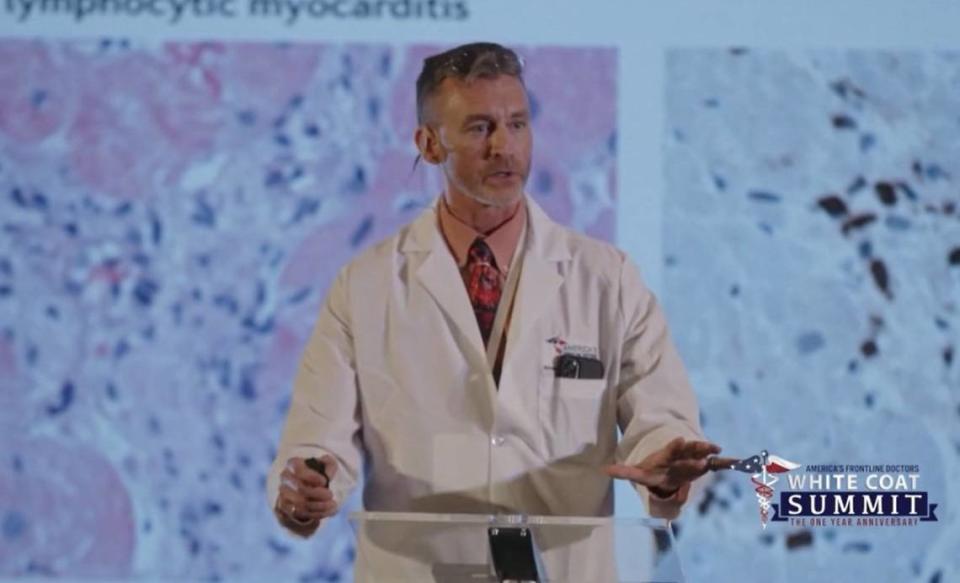
Other employees voiced similar concerns.
“There was no respect for what we did and what public health was all about,” a former nurse at Central District Health told the Statesman. “It just didn’t feel like a safe environment, and you couldn’t say anything, because if they were going to do that to everybody around you, you were next.”
Pannell told investigators at the Human Rights Commission that she wants no monetary compensation. Instead, she wants Central District Health to acknowledge the harm it caused. She wants the agency to establish a process for reporting human resources complaints if employees consider them unresolved, to require annual training on respectful workplace practices and employee rights, and for the board to be made aware of the allegations, she said in an email, which was forwarded to the Statesman.
Pannell told the Statesman she didn’t leave the health district because of the pandemic. She remains working in public health, having been hired shortly after as a bureau chief at the Idaho Department of Health and Welfare. But employees had no space to talk through trauma, she said, and they were placed under even more scrutiny every day.
The pandemic made staffers sensitive to their connections in the workplace, needing consistency and co-workers they can trust, she said. “We needed to heal.”
Angela Palermo contributed to this report.

